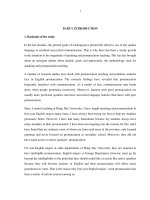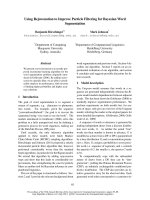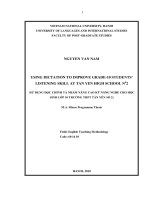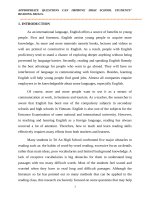Using Expectations to Improve Learning
Bạn đang xem bản rút gọn của tài liệu. Xem và tải ngay bản đầy đủ của tài liệu tại đây (56.5 KB, 2 trang )
Using Expectations to Improve Learning
Gena Bennett
Often, teachers do not realize the importance of expectations in their classroom.
Identifying and verbalizing expectations, as well as adapting and exceeding expectations
are crucial steps to providing a more productive and effective class. By utilizing these four
simple steps, teachers can ensure expectations serve as a positive agent in their classroom
Introduction
Teachers, students, parents and administrators have expectations. But are they really
important? What role, if any, do they play in the classroom? Expectations are a powerful
force, and certainly expectations come with being in the classroom. Expectations can serve
as a catalyst for success or failure, both for you and your students. Expectations can
increase motivation, increase your students' efforts, and maximize their potential. Here are
four easy steps to ensure expectations serve as a positive agent for your class.
Four Easy Steps
1. Identify
Identify the expectations surrounding your classroom: those of yourself, your students,
your parents, and your administration. Each player should be aware of what is expected of
him and what he expects.
2. Verbalize
Make a point to verbalize your expectations, and allow an opportunity for others to do the
same. Dedicate one or two class periods to discuss expectations. Be sure students
understand what is expected of them. Be sure students acknowledge what they expect of
you and of the class. If possible, capitalize on expectations. If students expect to learn
vocabulary, teach it! If appropriate, call parent-teacher conferences to communicate
expectations. If parents expect you to be strict, set good rules and adhere to them. (1)
Expectations is a big word--how can low level students verbalize their expectations? With
language as simple as, "please, " you, the teacher, can begin the process by writing on the
board, "Students, please _______________." Some new vocabulary may be needed such
as sit, chair: "Students, please sit in your chair." In turn, students should complete the
phrase as well, "Teacher, please _______________." You may even allow students to
initially use their native language to express ideas, then teach them the English vocabulary.
Even students with the lowest level of proficiency have expectations; and at this stage in
the learning process, it can be vital students know what is expected of them.
3. Adapt
If necessary, adapt your expectations. If you expect to spend a large portion of class
facilitating conversation development but your students' needs indicate a necessary focus
on reading skills, adapt. Expect to spend more time facilitating comprehension strategies.
If necessary, change your students' expectations. Dispel any misconceptions they may
have, such as expecting no homework. Explain why homework is important and how it
can help them learn. Let them know they can expect homework. If befitting, work with
your administration to develop more appropriate expectations for your school system;
remember to be diplomatic, open, and creative.
4. Exceed
Set expectations high, then exceed them. Students should not have the responsibility of
raising teachers' unmerited low expectations; we should challenge and motivate our
students with our expectations. Some expectations will be easy to exceed--if students do
not expect to learn anything, for example. Work as a team with your class to exceed
expectations. If your administration expects a certain percentage on a test or has a goal to
reduce absenteeism, work together with the class to exceed those expectations. Whatever
expectations your students or their parents have for the amount of learning that should take
place through class time, work together to exceed those expectations. Students will live up,
or down, to your expectations. Encourage your students to set high expectations of
themselves, then challenge them to exceed.
Conclusion
Expectations should not and realistically cannot be ignored. They will be discovered, both
positive and negative, even if not verbalized. Thankfully, with thought and simple effort,
you can make expectations work as a positive agent in your classroom.
Footnote
1. I want to point out that expectations should not be synonymous for rules. Expect
students to follow rules, but do not use expectations as a substitute for rules. You can
"expect" students to sit in their chairs, but if you want to make it a rule, your language
should distinguish it as such. I.e. You must sit in your chair.









